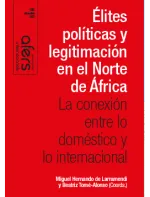Managing division: the EU and the conflicts in the Middle East and North Africa

Eduard Soler i Lecha, Profesor agregado de Relaciones Internacionales, Universitat Autònoma de Barcelona; investigador sénior asociado, CIDOB. Eduard.Soler@uab.cat. ORCID: https://orcid.org/0000-0001-8865-6810
This paper examines the European Union (EU) response to three conflicts in the Middle East and North Africa region and shines a spotlight on the degree of division among its member states and on the management of these divisions. It concludes that the EU’s desire to be seen as an international actor varies according to the confrontation; it is stronger in the Arab-Israeli conflict, but weaker in the Sahara. Domestic protest and politicisation in the EU affect the fragmentation of positions and the frequency of obstructionist stances. The EU manages the divisions differently in each conflict, with strategies that vary according to the level of ambition or the desire to ensure the sides note the existence of a European position. The paper highlights the growing interaction between the different regional flashpoints and makes the case for a systemic and multilevel approach.
Key words: foreign policy, European Union, Maghreb, Arab-Israeli conflict, Libya, Western Sahara
How to cite this article: Soler i Lecha, Eduard. «Gestionar la división: la UE y los conflictos en Oriente Medio y el Norte de África». Revista CIDOB d’Afers Internacionals, n.º 135 (diciembre de 2023), p. 193-217. DOI: doi.org/10.24241/rcai.2023.135.3.193
Revista CIDOB d’Afers Internacionals, nº 135, p. 193-217
Quadrimestral (October-December 2023)
ISSN:1133-6595 | E-ISSN:2013-035X
DOI: doi.org/10.24241/rcai.2023.135.3.193
Reception date: 06.06.23 ; Acceptance date: 07.09.23
Este artículo se enmarca en el Proyecto de Investigación y Desarrollo «La emergencia de la soberanía europea en un mundo de rivalidad sistémica: autonomía estratégica y consensos permisivos» (EUSOV)643385 financiado por el Ministerio de Ciencia e Innovación de España.
>> The full text articles of this issue are available only in Spanish language